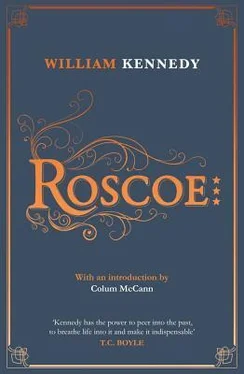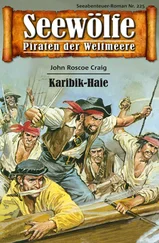“I regret that with every breath we both take, every breath of yours that might have been mine,” he says. “Haven’t you ever regretted it?”
“How can I talk about that?”
“I don’t know. All I can think about is that this is the first time in eighteen years I’ve been alone with you like this. I can’t believe you’re standing there looking the way you do.”
“Neither can I.”
He opens her robe, raises her slip. “I remember this,” he says.
“We can’t do this to him on his day, Roscoe.”
“Love me,” says Roscoe. His hand is on her in the old way.
“I love that you love me, Roscoe. But we can’t do this even if I want to, and I do seem to want to. But I won’t.” She pushes his hand away but it returns. “And I won’t let myself be tempted, no, Roscoe, no more.” She pushes his hand away. It returns. “Please, no more, Roscoe. Thank you, no more.” She pulls down her slip.
He sees strands of hair have fallen across one eye from her shaking her head no. He puts them in place with one finger, kisses her on the mouth. “I own some of you again.”
“No. You can’t own any of me. Nobody can own Veronica.”
“My memory can own anything.”
She reties her robe and says, “I shouldn’t have done this. You’re a love, Roscoe, but please go away.”
“Will I be a love after I’m gone?”
“Yes, but we won’t do anything about it. Once in a lifetime, Roscoe.”
Going down to the lobby in the elevator, Roscoe decides no devil in the eighth circle can punish him as exquisitely as Veronica. It might be years before they are again so close, and he hears her portal clanging shut. When he gets to the lobby the Brooklyn delegates are gone.
He goes to the Armory, which is decked with flags, bunting, banners, and some seventy-five hundred people, the place loud with marching-band music. He wants to find Elisha and the lost delegates, also get the latest delegate poll from Bart Merrigan and his team of canvassers. But Elisha isn’t here and the Brooklyn chairs are half empty. Bart says the latest figures look about the same, good, but it’s impossible to poll this crowd — more than a thousand delegates and alternates, a herd in chaos. They’ve listened to Albany’s Mayor Thacher welcoming them to town, and to a few warm-up speakers puffing the FDR-Garner ticket and the Democrat ic platform, especially their favorite wringing-wet plank: Bring back our beer. They’ve waited hours for their leaders to come up with a candidate to vote for and, still waiting, they’re now clanging cow bells, shaking castanets, waving signs and banners, blowing whistles. And then, in a spontaneous decision, they join in a raucous sing-along as the 10th Infantry Band plays “Sidewalks of New York,” Al’s tune; “Happy Days Are Here Again,” for Democrats every where who anticipate getting rid of Hoover; and “Anchors Aweigh” for FDR, who was assistant secretary of the navy under Wilson. As they sing, Roscoe sees their heads fly back and forth through the lofty reaches of the Armory, a mob of ready-to-wear delegates, one size fits all. If they only knew Elisha they’d vote for him, but, of course, they don’t vote, they dance headlessly to the tune being written this afternoon down at the DeWitt.
The Albany delegates — Mayor Thacher, a few aldermen and county supervisors, Party lawyers, a cadre of Democratic women-are, on Patsy’s strict orders, staying close to their chairs, ready to rise up and march in an instant demonstration for Elisha if it comes to a floor fight. Roscoe sees Alex sitting in an Albany aisle.
“Are you learning how we elect a governor?” Roscoe asks him.
“Yes, you sit around and sing,” Alex says. “I thought maybe somebody might argue about something.”
“They’re arguing, but it doesn’t show.”
“I love it anyway, Roscoe. It’s true American democracy made visible.”
“I wouldn’t go that far,” Roscoe says.
“What happens tonight, when the convention ends?”
“We celebrate. The town is waiting to party.”
“I’m ready to be the son of the new Governor.” And Alex shows Roscoe his hip flask.
“Precocious,” Roscoe says. “But pace yourself, young fellow. It’s going to be a long night.”
The band segues into “Will You Love Me in December as You Do in May?” for the New York City delegates, the tin-pan theme song of their ex-Mayor Jimmy Walker, who wrote it. Ah, Jimmy, who isn’t here and won’t be, but is a key figure in this convention’s impasse. Trouble has come to Jimmy this year after two years of investigations, begun by FDR and carried through by Judge Samuel Seabury into Tammany corruption. And certain New York judges, the sheriff, and assorted flacks have fallen victim to the right-thinkers. But Seabury’s charges also have led to Jimmy’s being summoned to Albany for a hearing, at which FDR will sit as solitary judge of the evidence of Jim’s “gross improprieties”—secret bank accounts, evasive answers, an inexplicable million in a safe-deposit box, the usual. FDR could actually remove the Mayor from office, which would be a first in state history, and a truly grievous wound to Tammany’s power.
On the August night in 1932 that Jimmy steps off the train at Albany’s Union Station for his face-off with FDR, skyrockets explode above the tracks, and the roar of ten thousand greets him—“Jimmy, Jimmy, Jimmy”—from people on the platforms, people wall to wall in the concourse, people filling Broadway, people Patsy wanted and Roscoe summoned through ward leaders and city department heads, the largest political turnout since Albany welcomed home Al Smith in defeat in ’28.
Patsy, Elisha, and Roscoe are closer to Jimmy than they are to anybody else from New York, including Al. Jimmy spent sixteen years in Albany as an assemblyman, a senator, then Senate leader until 1925, when Tammany tapped him for mayor of New York. He has dined often at Tivoli, pulled many an all-nighter with Patsy and Roscoe, supported Patsy’s legislation; in short, a grand fellow who became the lovable, re-electable Gentleman Jimmy, the dapper political playboy with the showgirl mistress and the persona behind which Tammany could methodically loot the city, an arrangement dating back to Tweed. The persona elects, the money perpetuates.
Patsy, since his youth, has been an ardent student of the Tammany method and has evolved into Tammany’s staunchest upstate ally. Why wouldn’t he give Jim a royal welcome? Patsy will never forgive FDR for generating all this trouble. In 1945, the year FDR dies, and after supporting him for president for four terms, Patsy will still be saying, “I didn’t like him. He didn’t like Tammany Hall, and they were the only thing in the world for me.”
There is a front-page Times-Union news photograph of Jimmy, Patsy, and Roscoe as they walk through Union Station on that August evening in ’32. Jimmy the dude is in a double-breasted gray plaid with the one-button roll, his best vest and kerchief, his sailor straw stylishly tilted onto his right ear. Patsy is also wearing his sailor, but pulled down as if he fears it will blow away, and he bulges like a puffball out of his collar and suit — it’s those mashed potatoes, Pat. And Roscoe, a bit to the right, appears almost thin beside Patsy, his fedora turned up like a diplomat’s homburg, and though modesty will never let him say so, his presence is one of companionate intelligence and dignity beside Jimmy’s dash and Patsy’s dumplingscape.
This is a war photo: three warriors marching into combat against what Roscoe calls the Morality Plague, Seabury only its latest manifestation. The Plague comes out of oblivion every seven or so years and, like the locust, builds its white houses in public cemeteries, and propagates, with evil simplicity, “truth” and “honesty” as political virtues. This has the popular appeal of chocolate, the distorting capacity of gin. But Roscoe wonders: Since when has truth been a political virtue? Can you name one truth that is every where welcome? Certainly there are none in play in any quest for, or defense of, political power — Jimmy’s, for instance-for power is based in the deep comprehension and perverse love of deception, especially self-deception, and any man who seeks power through truth is either a fool or a loser. Roscoe knows of no candidate’s ever making a campaign pledge to reveal all his own self-inflation, all those covetous, envious, lascivious, venal, and violent motives that drive every move he ever makes in politics and will continue making if elected. Roscoe certainly did not invent the perverse forces that drive human beings, and he can’t explain any of them. He believes they are a mystery of nature. He concedes that a morally pure society, with candidates unblemished by sin and vice, might possibly exist somewhere, though he has never seen or heard of one, and can’t really imagine what one would be like. “But I’ll keep looking,” he concludes.
Читать дальше












